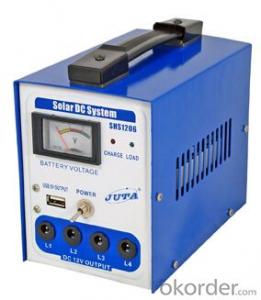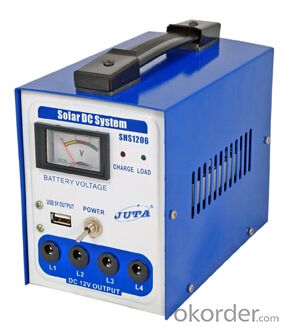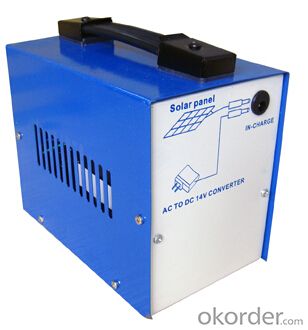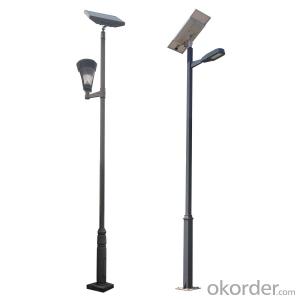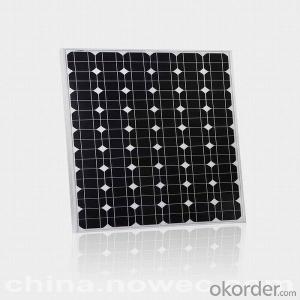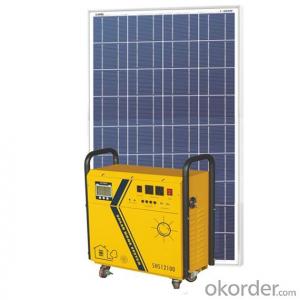4Ah/ 6W Solar Home System for Lighting Model SHS1206
- Loading Port:
- Shanghai
- Payment Terms:
- TT OR LC
- Min Order Qty:
- 5 set
- Supply Capability:
- 150 set/month
OKorder Service Pledge
OKorder Financial Service
You Might Also Like
1. Structure of 4Ah Solar Home System for lighting Model SHS1206
4Ah DC/6W Solar Home System is designed for the small family. All the power comes from solar energy, clean and friendly to environment.
This system is usually used for home lighting/house lighting: such as remote area, mountainous area, desert area, grassland area, village, country area, camping, outdoor activities, travelling for light at night. It will play an important role in daily life.4AH DC solar power system has following components:
1.Solar module: 12V/6W. With 8m cable and 2.1mm DC port,poly crystalline. (one set)
2.LED lights, 12V/3W, white color. With 4m cable and 2.1mm DC port. (two sets)
3.Battery box with controller built-in. (one set)
2. Main Features of Solar Home System for lighting Model SHS1206
· Smart shape
· Convenient to carry about
· Better integrality: all components are in the packaging, put into use immediately after open the packaging
· Easy to make the assembly
3. Solar Home System for lighting Model SHS1206 Specification
product name | rated charging current | rated working voltage | float charging voltage | low voltage disconnecting point | USB port current | working temperature | dimension |
4Ah DC solar home system | 1A | 12V | 14V | 10.5V | ≤500mA | -10℃~50℃ | 160mm×96mm×135mm |
model | rated discharge current | solar panel voltage | no load loss | low voltage reconnecting point | humidity requirement | storage temperature | |
SHS1206 | 2A | ≤25 | ≤8mA | 11.5V | ≤90%,no condensation | -15℃~40℃ |
4. Solar Home System for lighting Model SHS1206 Images
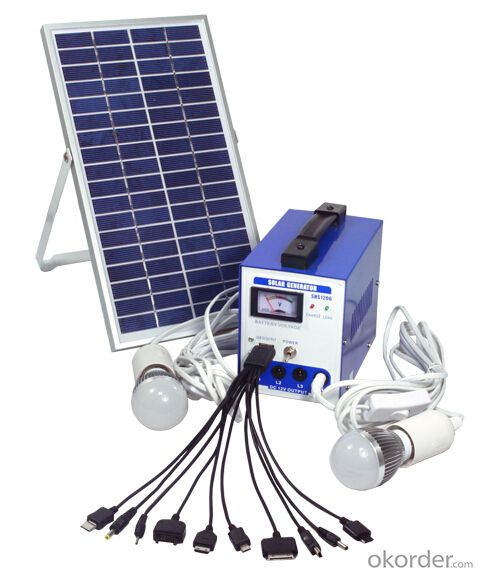
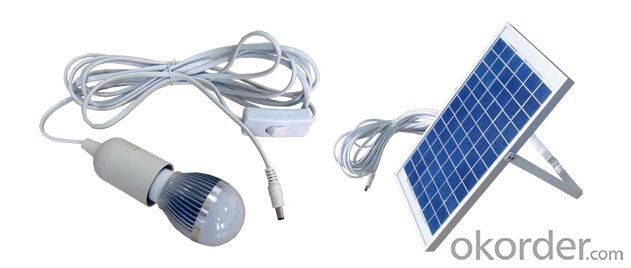
5. FAQ
We have organized several common questions for our clients, which may help you sincerely:
1) How to guarantee the quality of the products?
The company is approved by the ISO9000 quality management system with its strict product quality control. The products for exportation pass the inspection of relevant foreign nations (CE, ROHS), and get high evaluation of the customers.
2) How long can we receive the product after signing Sales Confirmation?
Generally speaking, if there is enough quantity of finished products which can meet the clients’ requirement, we can manage the delivery within three to five working days according to the instruction of the payment terms in the Sales Confirmation; if the products need some time to get ready, we will arrange thedelivery as soon as possible after the manufacture.
- Q: How does solar energy work?
- Solar energy works by converting sunlight into usable electricity through the use of solar panels. These panels contain photovoltaic cells that absorb photons from the sun's rays. These photons then excite the electrons in the cells, generating a flow of direct current (DC) electricity. This DC electricity is then converted into alternating current (AC) electricity using an inverter, making it compatible with the electrical grid or for direct use in powering appliances and devices. Solar energy is a clean and renewable source of power that reduces reliance on fossil fuels and helps mitigate climate change.
- Q: Can solar energy systems be used in powering shopping malls or retail centers?
- Yes, solar energy systems can definitely be used to power shopping malls or retail centers. Solar power has become increasingly popular and cost-effective in recent years, making it a viable option for commercial establishments. Large rooftops and parking lots of shopping malls provide ample space for installing solar panels, which can generate a significant amount of electricity to meet the energy needs of these facilities. Solar energy systems can help shopping malls and retail centers reduce their dependence on the grid and lower their energy costs in the long run. By utilizing solar power, these establishments can save on electricity bills and allocate those savings towards other operational expenses or improvements. Moreover, installing solar panels in shopping malls and retail centers can also enhance their sustainability and environmental credentials. As renewable energy sources, solar systems produce clean electricity without emitting greenhouse gases or pollutants. By transitioning to solar power, these establishments can significantly reduce their carbon footprint and contribute positively to the fight against climate change. Furthermore, solar panels can act as a visible demonstration of a mall's commitment to sustainability, which can attract environmentally conscious customers who prioritize shopping at eco-friendly establishments. This can potentially boost foot traffic and revenue for these retail centers. In conclusion, solar energy systems can certainly be used to power shopping malls and retail centers. By harnessing the power of the sun, these establishments can reduce their energy costs, improve their environmental sustainability, and attract customers who value eco-friendly shopping experiences.
- Q: Can solar energy systems be used for industrial process heat?
- Yes, solar energy systems can be used for industrial process heat. Solar thermal systems, such as solar water heaters or concentrated solar power systems, can effectively capture and convert sunlight into heat energy, which can be used for various industrial processes such as drying, sterilization, or heating fluids. These systems are sustainable and offer an environmentally friendly alternative to traditional fossil fuel-based heating methods, reducing greenhouse gas emissions and energy costs for industrial operations.
- Q: Can solar energy systems be used for powering boats?
- Yes, solar energy systems can be used for powering boats. Solar panels can be installed on boats to capture sunlight and convert it into electricity, which can then be used to power various onboard systems such as navigation, lighting, and appliances. This renewable energy source is clean, sustainable, and can greatly reduce reliance on fossil fuels while providing a reliable power source for boating activities.
- Q: Can solar energy systems be used for industrial applications?
- Yes, solar energy systems can be used for industrial applications. Solar power can be harnessed to generate electricity and provide heat for a wide range of industrial activities such as manufacturing, heating, cooling, and powering machinery. By utilizing solar energy, industries can reduce their dependence on traditional fossil fuels, lower operational costs, and contribute to a more sustainable and environmentally friendly future.
- Q: What is the impact of bird droppings on solar panel efficiency?
- Bird droppings can significantly reduce the efficiency of solar panels by blocking sunlight and reducing the amount of energy they can produce.
- Q: Can solar energy systems be used for powering industrial manufacturing plants?
- Yes, solar energy systems can be used for powering industrial manufacturing plants. With advancements in solar technology and the availability of large-scale solar panels, industrial manufacturing plants can harness solar power to meet their energy needs. This not only helps reduce reliance on fossil fuels but also contributes to cost savings and environmental sustainability in the long run.
- Q: Can a solar energy system be installed on a commercial building?
- Yes, a solar energy system can be installed on a commercial building. In fact, many businesses have embraced solar power as a sustainable and cost-effective solution for their energy needs. Installing a solar energy system on a commercial building offers multiple benefits, including reduced electricity bills, potential tax incentives and rebates, increased property value, and a positive brand image associated with environmental responsibility. Commercial buildings typically have ample rooftop space, making them ideal for solar panel installation. Additionally, advancements in solar technology have made it easier and more efficient to integrate solar systems into commercial buildings. With proper planning and professional installation, a solar energy system can provide clean and renewable energy to power various operations within a commercial building, contributing to a greener and more sustainable future.
- Q: What are the different incentives available for installing solar energy systems?
- There are several incentives available for installing solar energy systems, which can make this renewable energy source more financially feasible for homeowners and businesses. One of the most common incentives is the federal investment tax credit (ITC). The ITC allows individuals or businesses to deduct a percentage of the cost of installing a solar system from their federal taxes. Currently, the ITC offers a 26% tax credit for residential systems and commercial systems installed before the end of 2022. Another incentive is net metering, which allows solar system owners to receive credit for the excess electricity their system generates and feeds back into the grid. With net metering, homeowners can offset their electricity bills by using these credits during times when their solar panels do not produce enough energy, such as at night or during cloudy days. Many states also offer additional incentives, such as grants, rebates, or performance-based incentives, to further encourage the adoption of solar energy systems. These incentives vary by state but can significantly reduce the upfront costs of installing solar panels. Some utility companies also provide incentives through solar renewable energy certificates (SRECs). SRECs are tradable credits that represent the environmental attributes of a certain amount of electricity generated from solar energy. By generating solar electricity, homeowners or businesses can earn these SRECs and sell them to utilities, providing an additional source of income. Lastly, some local governments offer property tax exemptions or deductions for installing solar energy systems. This means that the added value of the solar system to a property is not subject to increased property taxes, making solar installations financially more attractive. All of these incentives help offset the initial investment and ongoing costs of solar energy systems, making them a more viable and affordable option for those interested in adopting renewable energy and reducing their carbon footprint.
- Q: Can solar energy systems be used in powering airports or transportation hubs?
- Solar energy systems have the capability to power airports and transportation hubs. By installing solar panels, we can harness renewable and sustainable energy from the sun. These panels can be positioned on airport buildings' roofs, parking lots, or the surrounding ground. The utilization of solar energy in airports and transportation hubs is multifaceted. It can generate electricity to power lighting systems, security cameras, and other electrical equipment within the airport premises. Solar power can also be used to charge electric vehicles like electric buses or airport shuttles. This promotes a cleaner transportation system and reduces carbon emissions. In addition, solar energy systems serve as a reliable backup power source during emergencies or power outages. This is particularly crucial for airports, as continuous operations and safety measures must be maintained. Recently, various airports worldwide have adopted solar energy to decrease their carbon footprint and operating expenses. For example, Cochin International Airport in India achieved the distinction of being the world's first completely solar-powered airport in 2015. It generates surplus electricity that can be returned to the grid. Overall, integrating solar energy systems into airports and transportation hubs is both environmentally friendly and economically advantageous in the long term. It diminishes reliance on fossil fuels, reduces energy costs, and contributes to a more sustainable and greener transportation infrastructure.
Send your message to us
4Ah/ 6W Solar Home System for Lighting Model SHS1206
- Loading Port:
- Shanghai
- Payment Terms:
- TT OR LC
- Min Order Qty:
- 5 set
- Supply Capability:
- 150 set/month
OKorder Service Pledge
OKorder Financial Service
Similar products
Hot products
Hot Searches
Related keywords
